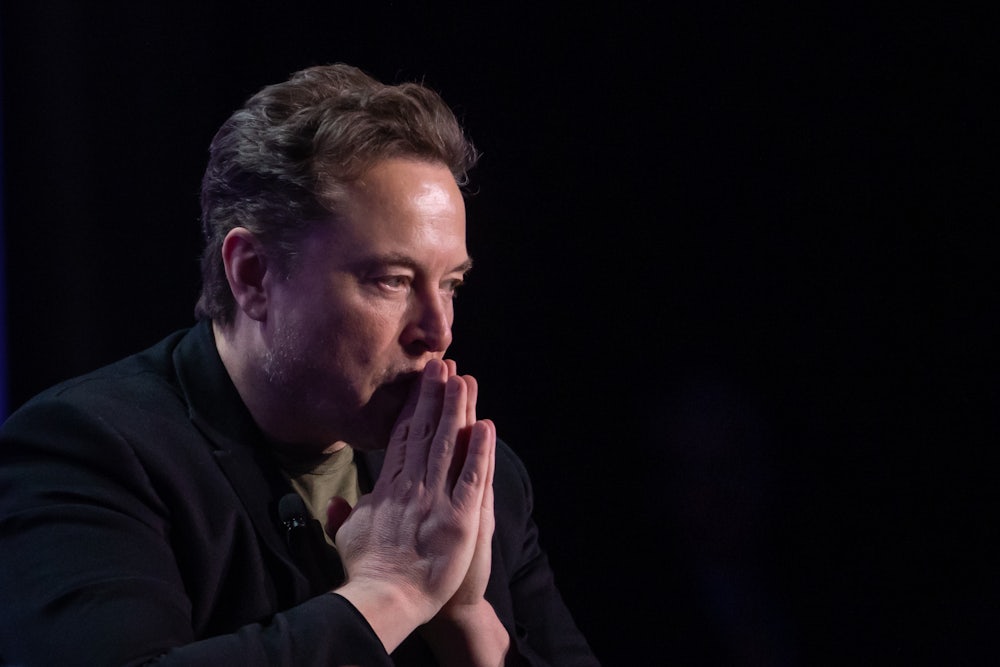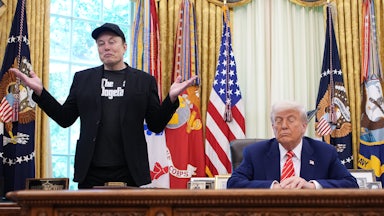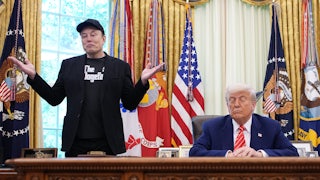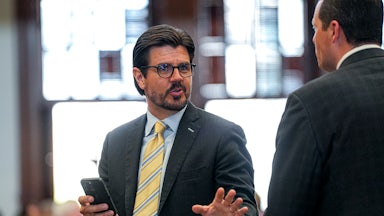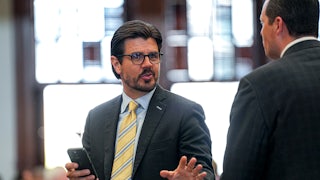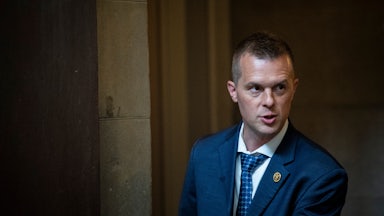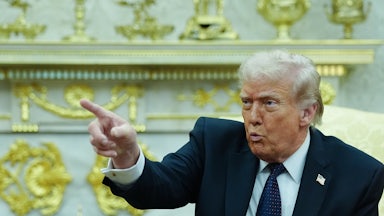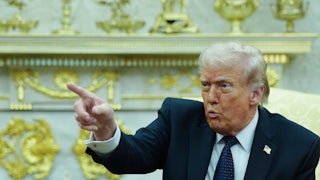It literally sounds like the plot of a dystopian science fiction movie: The richest man in the world befriends—and helps finance—another rich man who becomes president of the United States, who then gives his plutocratic benefactor carte blanche access to the operations of the federal government. The bedlamite billionaire instantly zeroes in on the obscure little office that oversees the writing of all the government’s checks, thus ensuring that he has the power to bring down the U.S. and global economy and even, if he so wishes, topple said president.
Oh, and—he’s also a right-wing extremist who recently spoke to the far-right German political party whose leaders say things like “Hitler and the Nazis are just a speck of bird poop in more than 1,000 years of successful German history.” He told them—with a wink-wink-nudge-nudge—that Germans placed “too much focus on past guilt, and we need to move beyond that.” And then there’s the matter of that salute, which of course, he denies was what many people—even or especially among those who delighted in it—thought it was.
What does Elon Musk want with control of the Bureau of the Fiscal Service and its computers that write the federal government’s checks? Maybe it’s benign. Maybe he and his team just want to scrutinize the hundreds of millions of payments the government makes to individuals, businesses, other governments, nonprofits, and so on and root out inefficiency.
It seems awfully unlikely that it’s benign. Musk tweeted over the weekend that the U.S. Agency for International Development, which has existed for six decades and spends billions on poverty relief, disaster aid, economic development, and more, is a “criminal organization.” But Musk’s motives aren’t even the main point here. The main point is that even if it is benign, it’s unprecedented and antidemocratic.
It’s unprecedented for the simple reason that no one has ever sought this authority before. CNN had a great piece of reporting over the weekend about how freaked out the bureau’s officials were by the Musk team’s requests and demands. That article begins:
A few weeks before Donald Trump was sworn in as president, members of his transition team went to the Treasury Department to talk about the handover of power.
But what is normally a routine discussion turned into an alarming series of interactions for a handful of top career Treasury officials.
Trump’s team, which included members of Elon Musk’s Department of Government Efficiency, peppered Treasury officials about one of the department’s most sensitive and critical functions: processing trillions of dollars in government payments a year.
The piece goes on to describe how Musk’s team wanted to know “granular details about the bureau’s proprietary computer systems” and to visit field offices where federal workers process payments.
No incoming administration ever has asked such questions. And there’s a very simple reason they haven’t: They were obeying the law. The law says that spending approved by Congress is to be spent, period. The Bureau of the Fiscal Service has zero discretion about deciding which checks to cut. This is what longtime Treasury official David Lebryk told them—and it’s exactly why they needed him out of the way and got Trump to place him on administrative leave. (He ended up leaving his post.)
Musk wrote on X over the weekend, according to CNN, that his team had “discovered, among other things, that payment approval officers at Treasury were instructed always to approve payments, even to known fraudulent or terrorist groups. They literally never denied a payment in their entire career. Not even once.”
He was trying to make this sound scandalous. It’s not. Not remotely! The opposite would be scandalous. The bureau spends the money Congress has approved. If fraudulence or terrorism is to be identified anywhere, that’s Congress’s job. Never denying a payment is the bureau’s job.
So that’s how it’s unprecedented. It’s antidemocratic because some of these people don’t even appear to have real positions in the government. Yes, Donald Trump was elected. But Elon Musk was not. And press accounts of these goings-on, you might notice, don’t identify a number of the people working on this effort by their official titles, presumably because they don’t even have them. They’re just called “Musk associates.” One, a man named Baris Akis, heads a venture capital firm. His presence at transition-period meetings, CNN reports, “raised alarms among some of the Treasury officials present for those early meetings, since he was not an official member of the incoming Trump administration and didn’t have a security clearance at the time.”
There was a very normal way for Trump to do all this. Form a committee and announce it publicly and name the people and lay out their qualifications and describe their mission. That’s how such moves are made in a democracy. But these people snuck in at night, and they didn’t seek merely the power to review all federal spending; they sought, and apparently have now won, the power to run literally the most sensitive computers in the country (outside of those associated with military operations).
The economist Dean Baker offers two speculations about motive. The first has to do with Trump: To Baker, the president may be planning on selectively approving which checks the bureau sends out, which would be illegal (again, because Congress has approved the spending). But “illegal” isn’t going to deter Trump. I doubt he’d touch individual entitlement payments. But federal contracts serving “undesirable” populations are the thing to watch. Over the weekend, Mike Flynn tweeted out the federal dollars that go to Lutheran services for immigrants and refugees. They are vast amounts, to be sure, but they were approved by Congress. Musk replied to Flynn that “The @DOGE team is rapidly shutting down these illegal payments.” (As journalist Timothy Burke noted on BlueSky Sunday morning, “Lutheran Social Services is one of the largest employers in South Dakota, operating senior living facilities across the state.” Imagine waking up to learn that your aging parents may be without a place to live because of this wrecking crew.)
The second has to do with Musk. Entree for Musk to this system of payments, Baker writes, “gives him access to an enormous amount of financial information about almost every person in the country. Musk has said that he wants to turn his Twitter social media platform into an all-purpose financial service operation. Having access to detailed information on hundreds of millions of people would give Musk a huge leg up in this effort.” That’s reassuring, isn’t it?
Finally, there is the not-inconsiderable chance that something important to the well-being of the economy may simply go kablooey. This is from Mike Masnick at TechDirt.com: “Remember how Elon Musk destroyed Twitter by ripping apart its infrastructure without understanding it? Now imagine that same playbook applied to the federal government. It’s happening, and the stakes are exponentially higher.” Masnick reminds us that at Twitter, Musk “transformed a platform used by hundreds of millions for vital communication into his personal megaphone, hemorrhaging somewhere between 60-85% of its revenue in the process.”
Will Musk do to the federal government what he did to Twitter? The plundering of that platform was a crime, metaphorically, but at least it was (more or less) victimless. Here, there will be victims—immigrants, refugees, poor people, sick people, and many others who interfere with the schemes of the world’s richest man, who believes Germany should stop apologizing.
